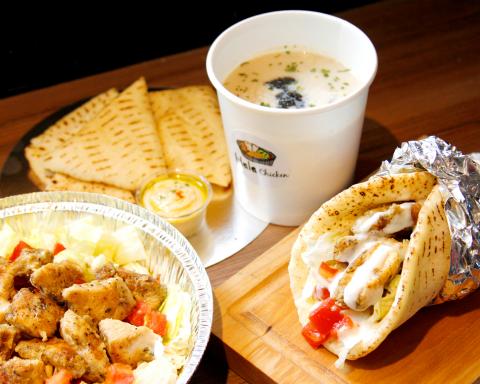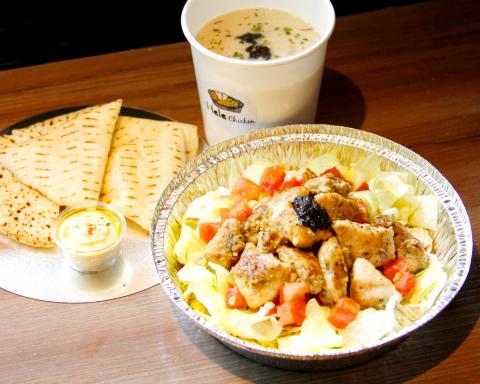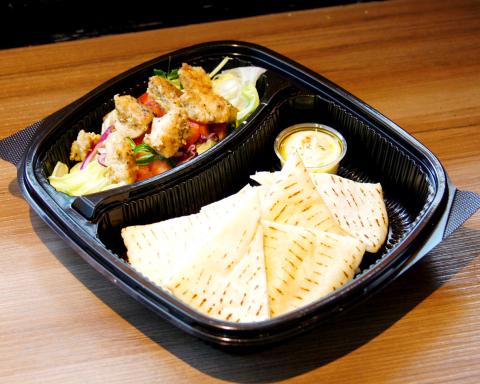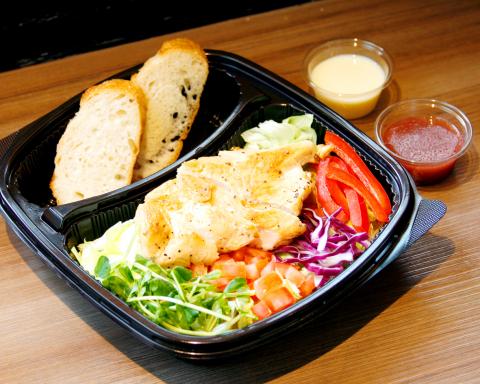New York City might conjure up images of hamburgers, hotdogs and pizzas, but chicken over rice is just as much a part of the food scene in the Big Apple, having assimilated cuisines by people from throughout the world.
So New York natives living in Taipei may rejoice with the opening of Hala Chicken in September of last year in Taipei’s East District because it serves up the kind of street food that would not be out of place in Manhattan.
A neon yellow sign embedded in a carved mural of the New York skyline beckons diners to the stall. Below the sign is a four-person bar, beyond which is the restaurant’s kitchen, its checkered floor and brick wallpaper giving the place a classic American diner look.

Photo courtesy of Hala Chicken
Hala Chicken’s co-founder/owner Alan Chiang (蔣委倫) grew up in New York where many street corners had a food cart serving quality food. He recently brought back to Taiwan his version of chicken over rice, an evolution of Middle Eastern cuisine and New York street food popularized by The Halal Guys.
Though the name is similar, Chiang makes it clear that Hala Chicken is not halal, meaning that its food is not in compliance with Islamic dietary law.
My order of Chicken Over Rice with pita bread (NT$130) was ready in a few minutes. Stuffed into a brown paper take-out bag, I laid its contents on the bar table. First, a mini plastic cup containing what New Yorkers would call “white sauce,” a mix of yogurt with a slight hint of mayonnaise (that veteran eaters might find a little too sweet), and another containing hot sauce, a mix of four kinds of chili peppers. My meal came in a foil dish, on top of which was a half piece of pita bread. I immediately poured the two sauces onto the chicken which lay atop a bed of basmati rice with crisp lettuce and fresh tomato.

Photo courtesy of Hala Chicken
Mixing the sauce into the dish, I dug in. I found the sauces the right combination of savory and creamy, yet still light and refreshing and going well with the succulent chicken. Along with a smaller dose of the hot sauce, it hits just the right balance.
My friend gave me a taste of his Truffle Chicken Over Rice (NT$150) which has a woody, nutty flavor. Despite being a popular dish, I found it slightly too sharp for my liking and turned my attention back to my meal.
The Chicken Gyro (NT$80) is a must try. Chicken, lettuce, rice and tomato wrapped in pita bread and secured with tin foil. The white sauce and chili sauce can be poured in at once, or added after each bite (I recommend the latter).

Photo courtesy of Hala Chicken
I took home a plate of their pita bread (NT$30) plus their homemade hummus (NT$20), which paired well with the dip. A guilt-free midnight snack.
Overall, Hala Chicken is a welcome addition to Taiwan’s street food scene, a combination of tastes both exotic and familiar.
Their second branch opened last month in Neihu District (內湖) and is located at 163 Yangguang St, Taipei City (台北市陽光街163號 ), tel (02) 8797-1900.

Photo courtesy of Hala Chicken

The Taipei Times last week reported that the rising share of seniors in the population is reshaping the nation’s housing markets. According to data from the Ministry of the Interior, about 850,000 residences were occupied by elderly people in the first quarter, including 655,000 that housed only one resident. H&B Realty chief researcher Jessica Hsu (徐佳馨), quoted in the article, said that there is rising demand for elderly-friendly housing, including units with elevators, barrier-free layouts and proximity to healthcare services. Hsu and others cited in the article highlighted the changing family residential dynamics, as children no longer live with parents,

Oct 20 to Oct 26 After a day of fighting, the Japanese Army’s Second Division was resting when a curious delegation of two Scotsmen and 19 Taiwanese approached their camp. It was Oct. 20, 1895, and the troops had reached Taiye Village (太爺庄) in today’s Hunei District (湖內), Kaohsiung, just 10km away from their final target of Tainan. Led by Presbyterian missionaries Thomas Barclay and Duncan Ferguson, the group informed the Japanese that resistance leader Liu Yung-fu (劉永福) had fled to China the previous night, leaving his Black Flag Army fighters behind and the city in chaos. On behalf of the

I was 10 when I read an article in the local paper about the Air Guitar World Championships, which take place every year in my home town of Oulu, Finland. My parents had helped out at the very first contest back in 1996 — my mum gave out fliers, my dad sorted the music. Since then, national championships have been held all across the world, with the winners assembling in Oulu every summer. At the time, I asked my parents if I could compete. At first they were hesitant; the event was in a bar, and there would be a lot

Smart speakers are a great parenting crutch, whether it be for setting a timer (kids seem to be weirdly obedient to them) or asking Alexa for homework help when the kids put you on the spot. But reader Katie Matthews has hacked the parenting matrix. “I used to have to nag repeatedly to get the kids out of the house,” she says. “Now our Google speaker announces a five-minute warning before we need to leave. They know they have to do their last bits of faffing when they hear that warning. Then the speaker announces, ‘Shoes on, let’s go!’ when